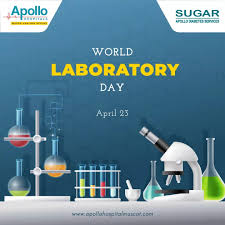Introduction: World Laboratory Day, observed annually on April 23rd, is a global celebration dedicated to honoring the pivotal role of laboratories in scientific research, innovation, and discovery. This day serves as a platform to recognize the contributions of laboratory professionals, scientists, and technicians in advancing knowledge, improving healthcare, and addressing societal challenges. In this comprehensive exploration, we delve into the origins of World Laboratory Day, its significance, how it is celebrated worldwide, and the profound impact of laboratories on scientific progress and societal well-being.
Origins of World Laboratory Day: The concept of World Laboratory Day emerged from a growing recognition of the importance of laboratory work in scientific endeavors. While the exact origins of the observance are not well-documented, World Laboratory Day gained prominence as a global initiative to highlight the critical role of laboratories in various fields, including healthcare, biotechnology, environmental science, and research.
Significance of World Laboratory Day: World Laboratory Day holds significant importance in several key areas:
- Advancing Scientific Research: Laboratories serve as the epicenter of scientific inquiry, experimentation, and discovery. World Laboratory Day underscores the crucial role of laboratories in generating new knowledge, conducting experiments, and developing innovative solutions to complex scientific challenges.
- Promoting Quality Assurance: Laboratories play a vital role in ensuring the quality, safety, and reliability of products and services across industries such as healthcare, pharmaceuticals, food and beverage, and environmental monitoring. World Laboratory Day highlights the importance of quality assurance practices and standards in laboratory testing and analysis.
- Enhancing Healthcare: Medical laboratories are essential for diagnosing diseases, monitoring patient health, and conducting medical research. World Laboratory Day acknowledges the contributions of medical laboratory professionals, including pathologists, medical technologists, and technicians, in providing accurate and timely diagnostic services and improving patient care outcomes.
- Fostering Innovation and Collaboration: Laboratories serve as hubs of innovation, creativity, and collaboration, bringing together scientists, researchers, and industry partners to tackle scientific challenges and develop groundbreaking technologies. World Laboratory Day promotes collaboration among laboratories, academic institutions, government agencies, and private-sector organizations to drive scientific progress and technological innovation.
Celebrating World Laboratory Day: World Laboratory Day is celebrated in various ways around the world, with activities aimed at highlighting the importance of laboratories and engaging the public in scientific discourse. Some common ways in which this day is observed include:
- Open House Events: Laboratories may organize open house events, tours, and demonstrations to showcase their facilities, equipment, and research projects to the public. These events offer an opportunity for visitors to interact with scientists, learn about ongoing research initiatives, and gain insights into the scientific process.
- Public Lectures and Workshops: Universities, research institutions, and scientific organizations may host public lectures, seminars, and workshops on topics related to laboratory science, technology, and innovation. These educational events provide a platform for sharing knowledge, exchanging ideas, and inspiring future generations of scientists.
- Outreach Activities: Laboratories may engage in community outreach activities, such as science fairs, school visits, and science-themed competitions, to promote scientific literacy and stimulate interest in STEM (science, technology, engineering, and mathematics) fields among young people.
- Recognition of Laboratory Professionals: World Laboratory Day offers an opportunity to recognize and celebrate the contributions of laboratory professionals, including scientists, researchers, technicians, and support staff. Awards, certificates of appreciation, and other forms of recognition may be bestowed upon individuals and teams for their outstanding achievements and dedication to advancing science.
Impact of Laboratories on Scientific Progress and Societal Well-Being: The celebration of World Laboratory Day underscores the profound impact of laboratories on scientific progress and societal well-being. Here are some ways in which laboratories contribute to advancements in science, technology, and healthcare:
- Scientific Discovery: Laboratories serve as incubators of scientific discovery, enabling researchers to explore new frontiers, test hypotheses, and uncover fundamental principles of nature. From unraveling the mysteries of the cosmos to unlocking the secrets of the human genome, laboratories play a central role in expanding the boundaries of knowledge.
- Disease Diagnosis and Treatment: Medical laboratories play a critical role in diagnosing diseases, monitoring patient health, and developing new therapies and treatments. Diagnostic tests, such as blood tests, imaging studies, and genetic screenings, conducted in clinical laboratories help healthcare providers make informed decisions and tailor treatment plans to individual patient needs.
- Environmental Monitoring and Protection: Environmental laboratories monitor air and water quality, assess soil contamination, and analyze environmental samples to identify pollutants and assess their impact on ecosystems and human health. By providing data and insights into environmental hazards, laboratories contribute to efforts to protect natural resources and mitigate environmental risks.
- Food Safety and Quality Assurance: Food testing laboratories play a crucial role in ensuring the safety, quality, and authenticity of food products consumed by the public. These laboratories conduct microbiological, chemical, and physical analyses to detect contaminants, verify ingredient composition, and assess food product integrity, thereby safeguarding public health and consumer confidence.
- Technological Innovation: Laboratories drive technological innovation by developing new materials, processes, and technologies that improve efficiency, enhance performance, and address societal needs. From nanotechnology and biotechnology to artificial intelligence and quantum computing, laboratories are at the forefront of innovation, shaping the future of science and technology.
Conclusion: World Laboratory Day serves as a global tribute to laboratories and the vital role they play in advancing science, innovation, and societal well-being. By celebrating the contributions of laboratory professionals, promoting scientific literacy, and fostering collaboration and innovation, this observance reaffirms the importance of laboratories as engines of discovery and progress. As we commemorate World Laboratory Day each year, let us recognize the invaluable contributions of laboratories to scientific knowledge, technological innovation, and the improvement of human lives.






